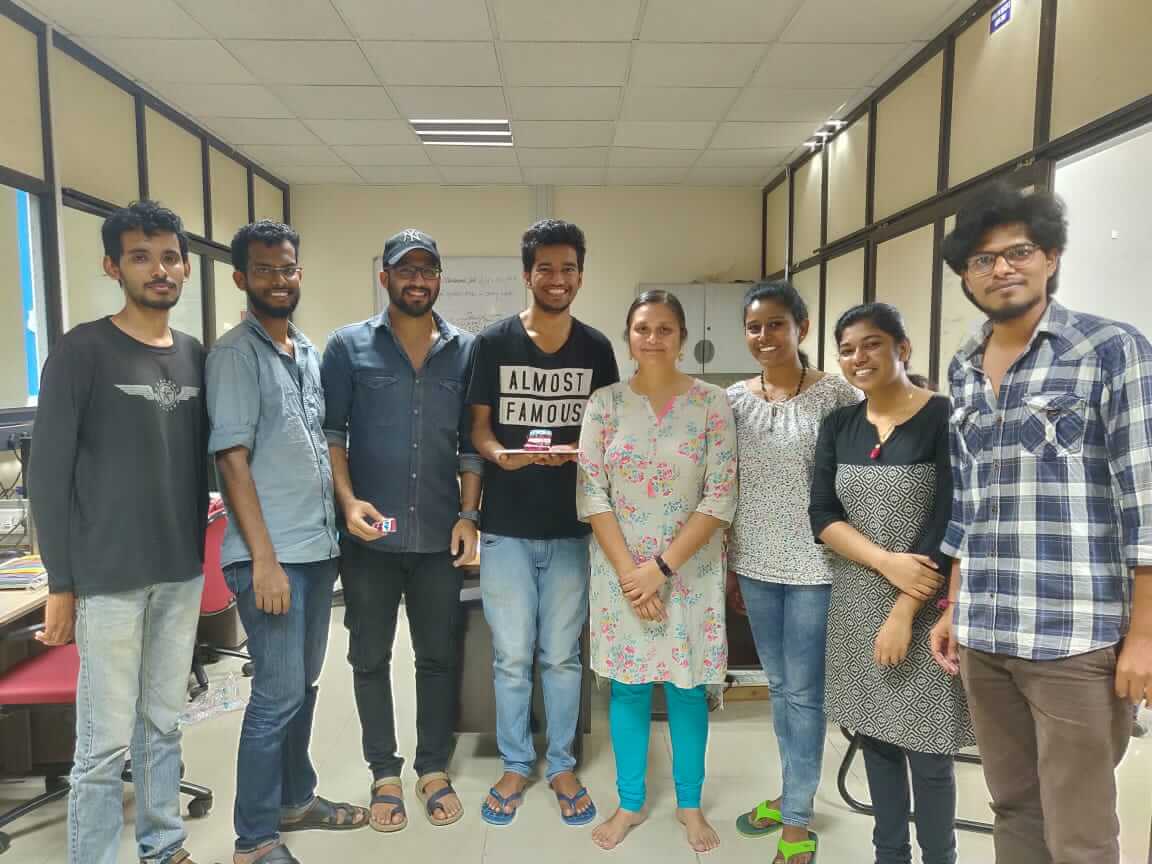#WIISER Spotlight | Dr. Deepshikha Jaiswal Nagar: Solving new challenges on her way, through a noxious work environment
WIISER : Women in Science at IISER
Neha K, Sheena Shaji and Arunita Banerjee

Dr. Nagar with a few of her lab members, at IISER Thiruvananthapuram
Dr. Deepshikha Jaiswal Nagar, Assistant Professor, the only woman faculty in the Department of Physics at IISER Thiruvananthapuram, is a condensed matter physicist. She spoke to Cogito137 over an email interview, where she talks of the gender imbalance in her department, trust issues in academia and importance of bracing new problems and challenges in science.
1. Who or what inspired you to become a scientist and what are the primary challenges that you have faced in this career?
Primarily, my father.
The primary challenge that I have faced in this career is the severe underrepresentation of women in my department. I am the lone woman voice in a department that has 23 faculty members. Often my colleagues are very abrasive in their behaviour and it gets difficult to maintain sanity.
2. How would you explain the research in your lab and its importance to a layperson? What motivated you to choose this field of research?
To a layman:
Among household items, we find some good conductors of heat and electricity. For instance, copper or steel vessels, which we use for cooking food. If you touch these vessels, they are very hot. However, if you touch their handles, they are not so hot. The former are broadly called conductors while the latter are called insulators. It is very difficult to transform insulators to conductors just by putting them in contact with some heat source or by cooling them with ice for instance. Part of my research is on such materials that transform from being extremely insulating to such good conductors that their conductivity is even better than gold or silver-one of the best known conductors. This transformation is achieved only by changing the temperature of such materials. We grow these materials in the lab using furnaces and then study their properties by performing different kinds of experiments on them.
My physics teachers at Banaras Hindu University, where I did my M.Sc, inspired me to study condensed matter physics. I also came across other excellent teachers who aroused my interest in this subject.
3. Since you have had research experiences both in and outside India, please tell us how contrasting are the atmospheres? What changes, do you feel, are required to improve the Indian system for the better?
Indian system works on mutual mistrust. Everybody that I see around me mistrusts each other. If there is an environment of mistrust, how will people collaborate? Great work arises out of big collaborations. When different groups having expertise in different fields come together to work together on a problem, they produce good work. Additionally, I also find people hesitant to work on problems that are tough, involve hard work but are doable and may deliver great output.
I do not have any clear cut answers for what can be done to change people's mindset. What I have done for myself is to stay positive and try and find like-minded people with whom I can work.
4. How does a supervisor's role influence a student's career? What were your experiences with your mentors and how has it affected your approach towards science?
I think a supervisor has a great role in shaping a student's career. My supervisor was an extremely smart and a kind man. He taught me the importance of never being afraid in trying new things and taught me to be independent. He also taught me the importance of doing quality research rather than doing run-of-the-mill things just for the sake of doing things. All of this has shaped my own way of doing research.
5. With the establishment of new and premier science institutes like IISERs, the number of students taking up basic sciences has increased considerably. What advice would you give to students who hope to make a career in scientific research?
You people are getting a quality of education that we could only dream of. Do not be afraid of trying out challenging problems. Simultaneously, keep your feet grounded. Finally, the ones amongst you who will be able to make the cut will be the ones who have both.
This electronic interview was coordinated and conducted by Neha K, Sheena Shaji and Arunita Banerjee for Cogito, IISER Kolkata.
Neha and Sheena have just completed their BS-MS curriculum at IISER Thiruvananthapuram, but are still awaiting their official graduation. They joined IISER TVM in 2015 and majored in physics. Neha completed her MS thesis under the guidance of Dr. Nagar and Sheena under the guidance of Dr. Anil Shaji. Neha intends to pursue her future studies in experimental condensed matter physics and Sheena is interested in theoretical physics.
signup with your email to get the latest articles instantly